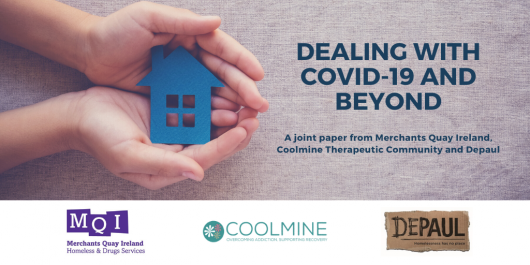
Depaul, together with Merchants Quay Ireland (MQI) and Coolmine have teamed up to outline what they feel needs to happen beyond Covid-19 to ensure those experiencing homelessness and addiction continue to recieve the required supports.
Depaul, Merchants Quay and Coolmine have strong collaborations in our work, share information and work together to meet the existing and emerging needs of those who need our help and support. Working together is key to improving access to housing, health, and social outcomes for those who use our services.
In this context, we decided to come together to submit this paper to Government to highlight the positive outcomes because of the response to the pandemic across the voluntary and statutory sectors. But also, to highlight the continuing and complex needs of our service users as we work together to reopen the country and as we look further ahead into the future.
Across the three organisations, services are provided within a continuity of care and support ranging from high support accommodation to health & harm reduction services to residential & community detox/treatment services to those marginalised in society with very complex needs.
Mary is a 49 year old woman who has been accommodated within a homeless ‘cocooning’ facility during Covid-19. Due to her current medical condition Mary is in a high-risk category as her immune system is compromised.
Mary says, “I got my kidney removed and I have also got my hip replaced about 36 weeks ago. I also suffer from cryptogenic organising pneumonia (COP), eczema and asthma.
“I was sharing a house with 35 other women so if it came into the house, I could have died from it. So, my doctor got me put into the hotel I’m in now”.
Mary has been ‘cocooning’ for over 12 weeks in the hotel and explains how she feels about her current situation.
“I do feel comfortable here. You are not sharing a room; you are in the room on your own. It’s clean, it’s nice. The way you’d like to have your own little place. Clean and tidy. I don’t have to share a bathroom. I don’t think people, on health grounds, should have to share a toilet”.
Mary says the thoughts of what will happen once she has to move from her current accommodation ‘scares’ her. “That’s what worries me when this is all over, where am I going?
Mary now has a key worker. The aim will be to ensure that she receives the assistance to obtain long term accommodation suitable for her needs and not return to temporary accommodation or rough sleeping. It’s also essential that Mary receives health and medical support within the community that meets her complex needs if she obtains a tenancy.
To find out more you can download a copy of our joint report here.